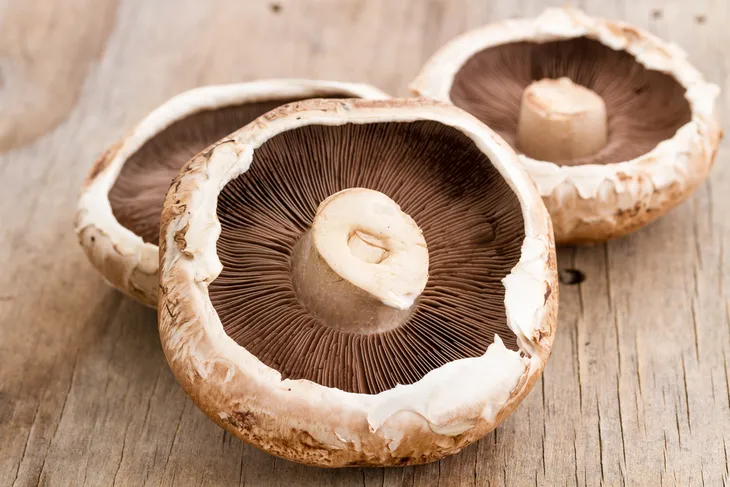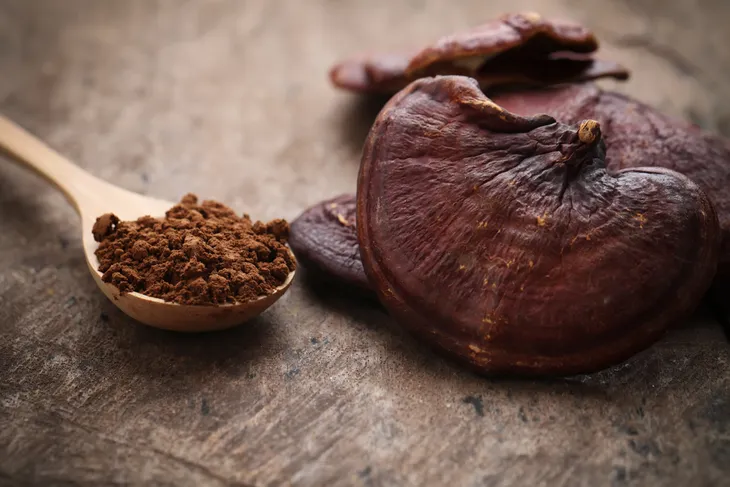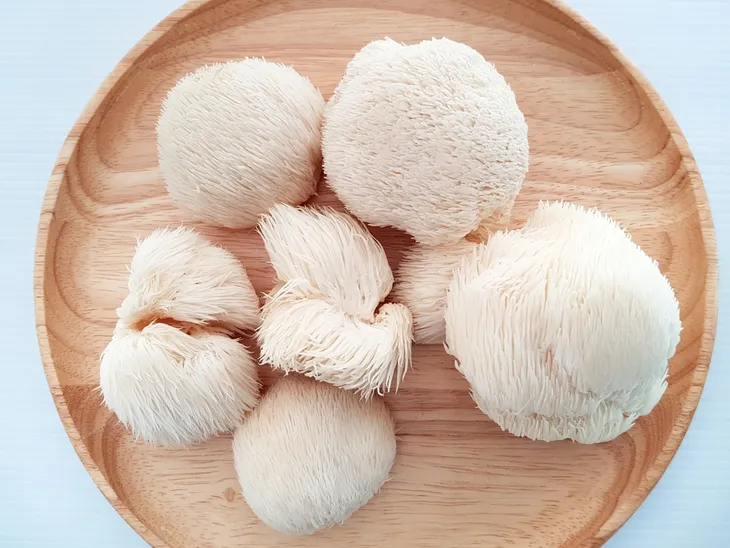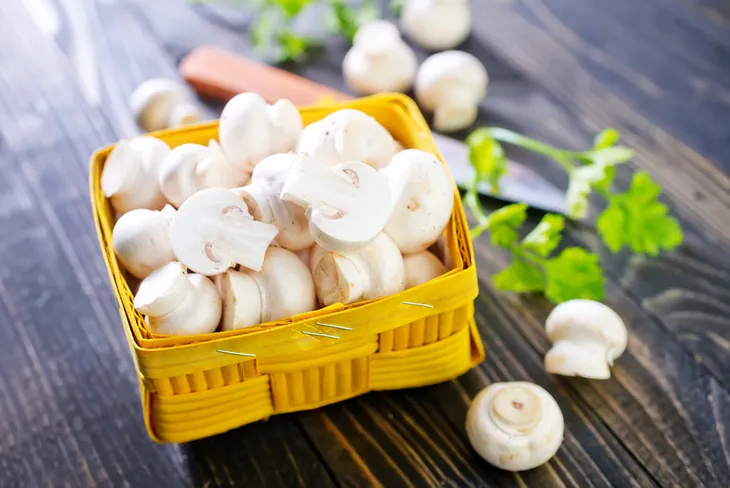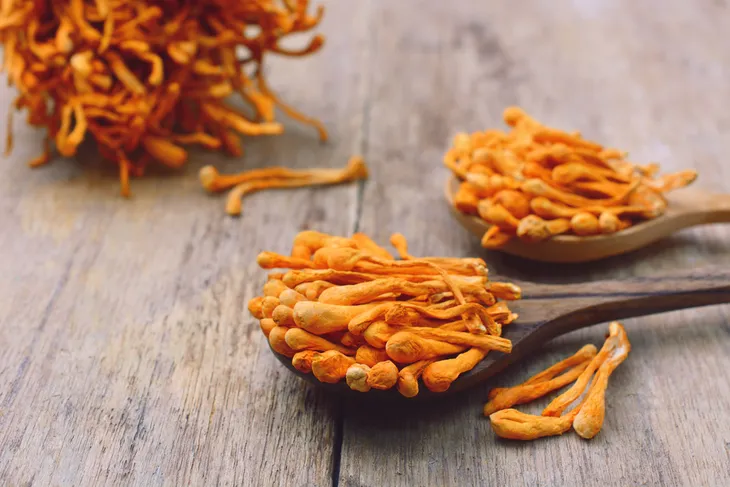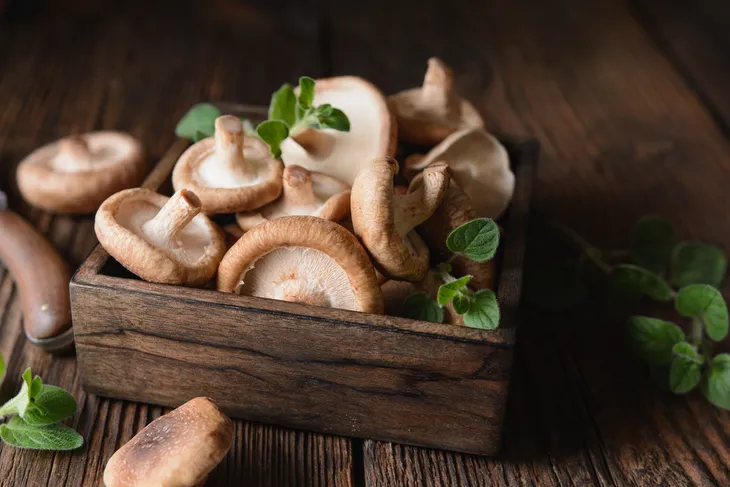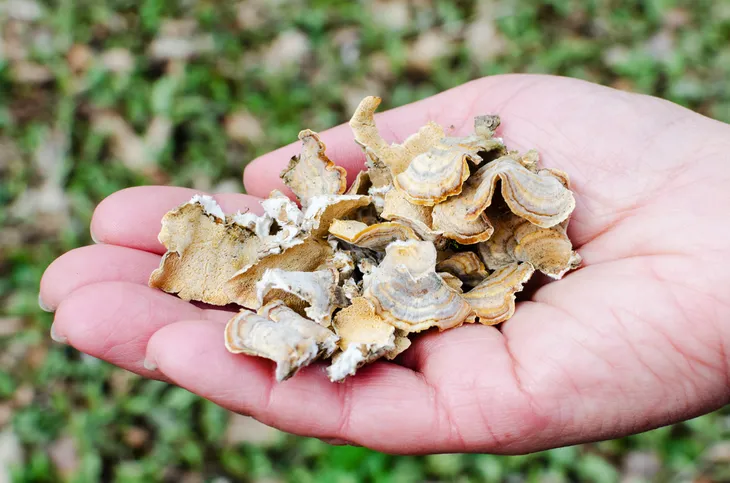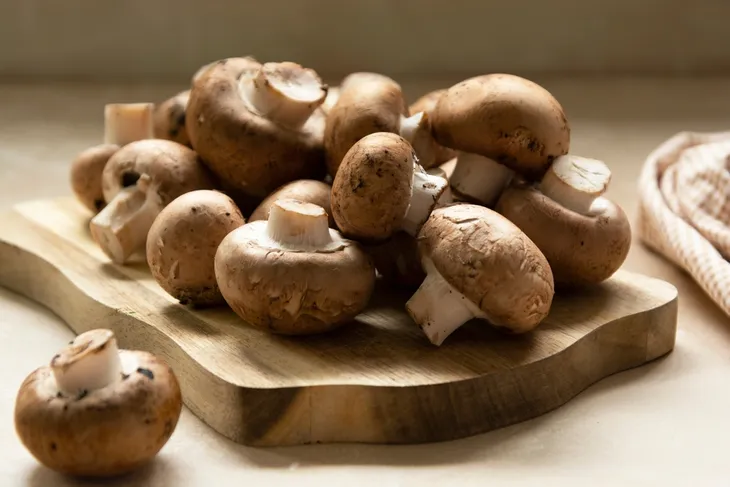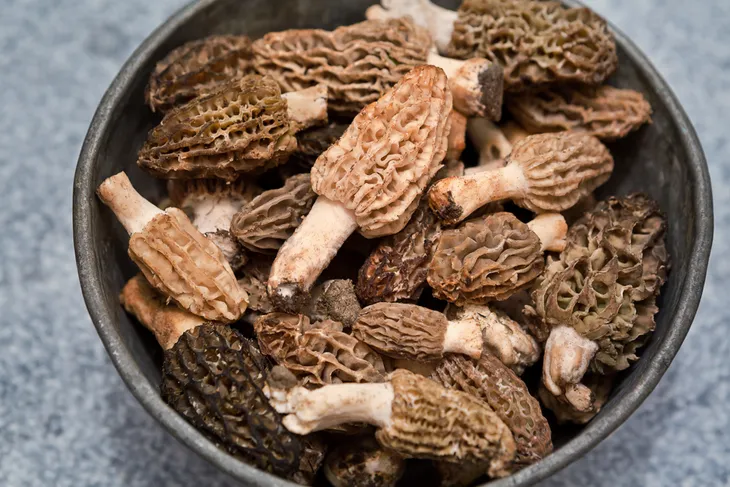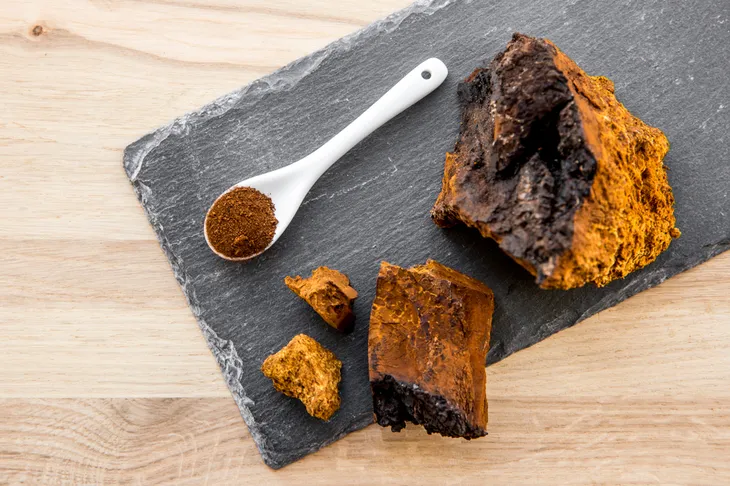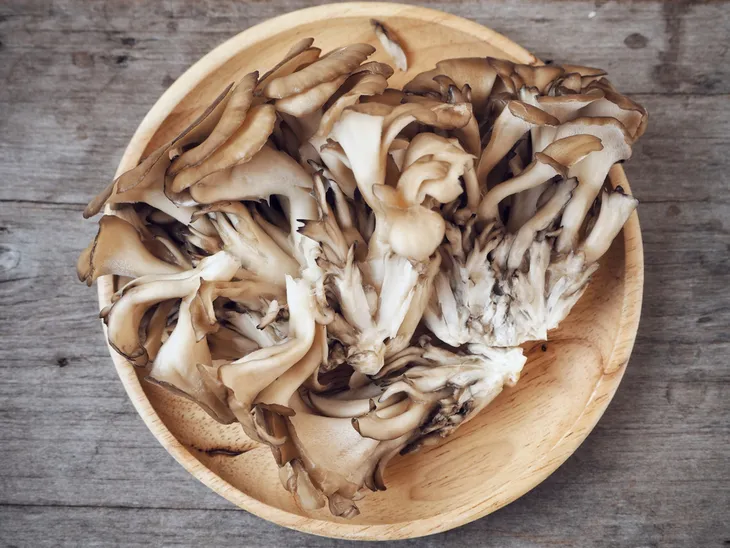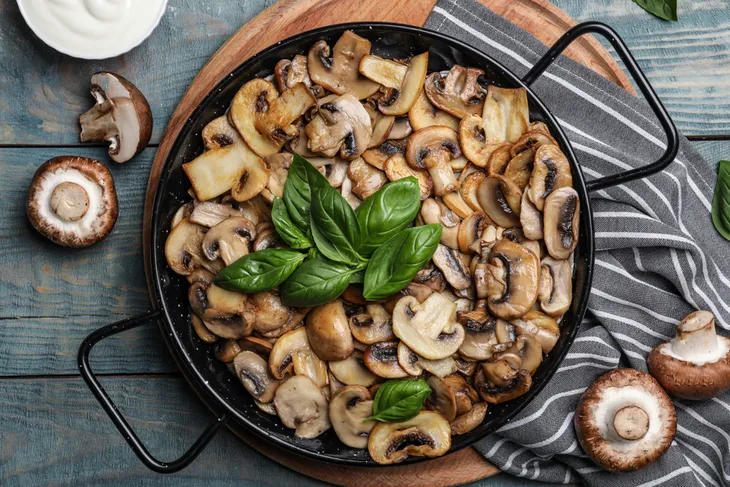- Mushrooms are great sources of fiber, vitamin D, antioxidants, and other nutrients.
- They can help support good health in several ways, including boosting immunity and improving gut health.
- Healthy options include common white button mushrooms and lesser-known chaga mushrooms.
Mushrooms are small but mighty nutrient powerhouses. They offer several health benefits, ranging from increasing immunity to decreasing inflammation. Plus, they’re typically affordable and easy to add to a variety of dishes.
Of course, some mushrooms are healthier than others. But how do you know which mushrooms pack the most punch? Keep reading to learn about 11 healthy mushrooms to add to your diet.
Portobello Mushrooms
Portobello mushrooms, also known as portabella mushrooms, are one of the most commonly consumed types of mushrooms. They’re also one of the healthiest! According to Livestrong, portobello mushrooms are rich in nutrients like fiber, B vitamins, phosphorus, selenium, copper, and potassium.
And because portobello mushrooms have a meaty taste and texture, they make a healthy substitute for meat. Grill portobello mushroom caps to replace hamburger patties or chop them up to use as substitutes in meat sauce. Portobello mushrooms are tasty on pizza and salad, too.
Reishi Mushrooms
Reishi mushrooms are medical mushrooms with several health benefits. According to MedicineNet, reishi “boosts immunity, promotes restful sleep, fights fatigue and reduces stress.” So, reishi mushrooms may help ward off colds and other viruses.
Since they taste bitter, many people don’t eat reishi mushrooms whole. Instead, reishi is typically ground-up and consumed via capsules or powder stirred into coffee, tea, hot chocolate, or smoothies. Flavorful beverages can help mask the distinct taste of reishi mushrooms.
Lion’s Mane Mushrooms
When you picture mushrooms, you probably don’t envision pom-pom puffballs. But perhaps you should! That’s because lion’s mane mushrooms have a lot to offer. For instance, MedicineNet calls them “the mushroom for the mind.”
The source says lion’s mane mushrooms have beta-glucans, which are known for their “tumor-protecting, immune-boosting and brain-protective properties.” Given that, they may help protect against diseases like Alzheimer’s and Parkinson’s. They taste like seafood, so they can substitute crab and lobster.
White Button Mushrooms
Much like portobello mushrooms, white button mushrooms are another supermarket staple that packs a punch. Registered dietician Mary Wirtz tells Men’s Health that white button mushrooms can help “strengthen the immune system by protecting and repairing body tissue.”
Healthline says other potential benefits include lowering blood sugar levels and improving gut health. Since they have a mild taste, you can add white button mushrooms to a variety of dishes. For example, add them to your omelet at breakfast and your stir-fry at dinner.
Cordyceps Mushrooms
Scientific American says cordyceps mushrooms have “long been used in ancient Chinese and Tibetan medicine.” According to the source, they’re said to help with a wide range of health concerns, from headaches and coughs to rheumatism and kidney disease.
Healthline specifically highlights the benefits of cordyceps mushrooms for athletes. For example, the source says cordyceps may boost athletic performance and shorten post-workout muscle recovery time by helping the body “utilize oxygen more efficiently and enhance blood flow.”
So, consider adding cordyceps mushrooms to your pre- or post-workout meal. Alternatively, you could add powdered cordyceps to your smoothie or tea. Either way, cordyceps could be a great choice if you regularly work out.
Shiitake Mushrooms
If you already cook with mushrooms, then you might be familiar with shiitake mushrooms. They have a mild savory taste that makes them easy to add to soup and pizza. You can sauté, roast, or fry shiitake mushrooms. What you might not realize, though, is just how good they are for your health.
Men’s Health says shiitake mushrooms are a good source of amino acids, sterols, polysaccharides, B vitamins, fiber, and essential minerals. According to the source, “research has shown that regular consumption of shiitake mushrooms increases immunity and decreases total body inflammation.”
Turkey Tail Mushrooms
According to the National Cancer Institute, turkey tail mushrooms have been used in cancer treatment plans in Japan and China for more than 30 years. They haven’t been approved in the U.S. for this use, but Healthline says research indicates that turkey tail mushrooms may help fight cancer in a few ways.
For instance, the source references studies that show turkey tail mushrooms may help improve cancer survival rates, fight leukemia cells, and boost the immune system of chemotherapy patients. However, cancer patients should talk with their doctor before adding turkey tail mushrooms to their diets.
Besides the potential benefits for those fighting cancer, MedicineNet says turkey tail mushrooms may help support gut health and the immune system. Since they’re thick and chewy, many add powdered turkey tail mushrooms to smoothies, soups, and tea instead of cooking with them.
Crimini Mushrooms
Crimini mushrooms, also known as baby bellas, are another popular option for cooking. Similar to portobello mushrooms, they have a savory flavor that makes them a tasty addition to a variety of dishes. In fact, WebMD says they’re a great way to cut your salt intake.
“Due to the strong, savory flavor of crimini mushrooms,” the source explains, “people don’t feel the need to add as much salt to dishes that contain them.” Additionally, Men’s Health says crimini mushrooms contain minerals and antioxidants like selenium, phosphorus, and ergothioneine.
Morel Mushrooms
While less common than portobello mushrooms, morel mushrooms also make a savory and healthy addition to meals. Since they’re often sold dehydrated, Men’s Health suggests soaking them for 15-minutes in hot water before draining and chopping them. Then add them to omelets, pasta, quiche, pizza, etc.
As for the health benefits, WebMD says morel mushrooms are a great source of iron and vitamin D. A 100-gram serving meets the daily iron requirement for men and fulfills more than half the daily iron requirement for women, according to the source. And SFGATE says 1-cup provides 22-percent of your daily vitamin D requirement.
Chaga Mushrooms
Chaga mushrooms are such an antioxidant powerhouse that MedicineNet calls them “the king of medicinal mushrooms.” As a result, the source says chaga mushrooms may boost “immunity, brain health and liver health.”
Even though Americans might not be very familiar with chaga mushrooms, WebMD says Northern Europeans and Russians have used them for hundreds of years. So, how can you include them in your diet? Add chaga powder or extract to tea, soup, batter, dough, etc.
Maitake Mushrooms
If you want to up your intake of vitamin D, then consider eating maitake mushrooms. Men’s Health says 1-cup of diced maitake mushrooms provides 99-percent of your daily vitamin D requirement. WebMD says plant-based foods don’t usually have much vitamin D, making mushrooms like maitake so interesting.
Maitake mushrooms have an earthy taste that works in many types of dishes, including stir-fry, omelets, pasta, pizza, soup, and salad — basically, any dish you’d typically add mushrooms. Speaking of their versatility, Men’s Health says maitake mushrooms taste great grilled or broiled.
Things to Keep in Mind
Regularly eating mushrooms can help support good health. They’re great sources of fiber, vitamin D, selenium, potassium, and other vital nutrients. Plus, they’re easy to include in things you already make, like pasta and soup.
However, they aren’t replacements for treatment plans overseen by your doctor. Also, be sure to talk with your doctor before making any big changes to your diet. That said, mushrooms are nutrient powerhouses with a lot to offer many people.

